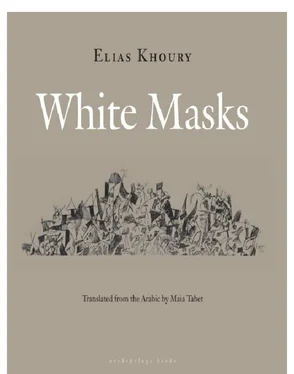But look what was happening to him now! Not quite knowing how, Moeen Abbas found himself in his tiny room, lying beside Mona, sprawled out on his bed. And then it all happened, and afterwards as he watched her get up to get a pack of cigarettes, completely naked with her brown back glistening, he felt he must be the luckiest man alive, and he resolved to stay by this woman’s side for ever and ever.
She came back with two lit cigarettes, nestled her head against his chest, and started smoking. She talked about everything under the sun, about the loathsome bald professor who chewed gum while dissecting corpses, about the smell of formaldehyde, which made her feel nauseous, about politics and Camp David, and the war. He wanted to talk to her about love, he wanted to tell her that he had set his mind on marrying her, he wanted to tell her about Sana’, about Gaza and the hospital he would work in when they went back together to the occupied Strip.
“I have to go home now,” she said. He wanted her to stay and sleep by his side the whole night long.
When Mona left, Moeen decided he would write Sana’ a letter and tell her the truth — although it would be a blow, he felt he owed her the truth. When he saw Mona the next day, she seemed upset, she told him to be careful because a decision had been made to deport all Palestinian students from Egypt. As he listened to her saying she felt afraid for him, he felt afraid only of losing her, and he wanted to tell her that he loved her and had decided to marry her. On an impulse, he made up his mind to tell her about Sana’ and how he was going to end it with her. But Mona didn’t let him get a word in edgeways.
“Watch out, brother Moeen, they are after you.”
He couldn’t have cared less, he wasn’t afraid of anything. He asked her to come back to the room with him, but she said not today, she couldn’t.
That evening, as he sat alone trying to write something about love, there was a violent banging on the door. When he opened it, he was immediately seized and dragged down the stairs. “But I need to. .” Not allowed to finish his sentence, he was thrown into a military jeep and told by the soldier accompanying him that he was being put on the first plane out of Cairo.
“But what about my belongings… my clothes, my books?” The soldier said he knew nothing about that, these were his orders.
And, sure enough, they took him to the airport, where he waited for three hours in a tiny room the size of a prison cell and then was made to board a plane. As the plane took off from Cairo Airport, Moeen Abbas felt around in his pockets: he found he had almost five Egyptian Pounds on him and a box of Cleopatras with nine cigarettes left. In a complete daze, he wasn’t even able to ask the stewardess where the plane was bound, and did not hear the captain announce over the PA system that they had landed at Damascus Airport. He had nothing to eat, just drank a bottle of Pepsi and felt his stomach burning from its acrid flavor.
Moeen Abbas got off the plane with nothing to his name; he had neither a passport nor identity papers, only his student card. Even so, the airport official was polite to him.
“You’re one of the deported?”
“Yes,” he replied.
“Welcome, welcome.”
And he handed Moeen a piece of paper and told him to report to the immigration authorities within the week. Moeen Abbas left the airport building without a clue as to his next destination. The only possible place to go, he thought, was the Yarmouk refugee camp, where he knew his father had some first cousins. He got a taxi to drive him there, but when he handed over the five Egyptian Pounds he had on him, the driver began to curse and told him that he wasn’t about to accept such a paltry sum.
“But I have nothing else,” Moeen pleaded.
The driver continued to shout, curse, and threaten, undeterred by the crowd gathering around the car. An old man stepped forward and asked what the trouble was. Raising his voice above the driver’s vituperations, Moeen explained how he came to be where he was and was candid about the fact that he had absolutely nothing to his name. The old man settled the fare, some fifty Syrian lira, and Moeen couldn’t thank him enough. When the old man asked him if he had any relatives in the camp, Moeen told him about his father’s cousins. The old man thought for a while and said that he personally didn’t know anyone by the name of Abbas, but he invited Moeen into his own home. When Moeen politely declined the offer, the old man suggested he could stay in the camp mosque.
So Moeen went to the camp mosque. One of the onlookers at the taxi scene had given him twenty-five lira in exchange for his five Egyptian Pounds, with which he was able to buy himself a can of sardines and two loaves of flatbread. He ate in the courtyard, and then, feeling exhausted, went inside the mosque, found himself a dark corner in which to lie down, and fell asleep.
Moeen lived in the mosque like this for five days, five whole days and nights during which he did not budge, other than to go and buy himself a little food. He had no idea what to do with himself. It seemed to him that he was going to end up being one of those shaggy-bearded beggars, sitting outside mosque doors with a begging bowl at his side.
Then, one day, a man in his forties who had been watching him all this time and sometimes seemed to be on the verge of speaking to him came up to him and put his hand on Moeen’s shoulder. “Listen,” he said, “everybody here knows what happened to you, and the camp’s welfare association has decided to collect some money on your behalf. They’ve done it without telling you, but expect a man to come tomorrow and hand you 8,000 lira.”
“Thank you very much, but. .”
“But, naturally, you wouldn’t know what to do with that much money. I’ll tell you, son, I can get you a passport and a visa to Sweden, as well as a plane ticket. And it’ll only cost 5,000 lira.”
“But I don’t know anybody in Sweden.”
“You’ll meet people. Sweden is a beautiful country, it’s a wonderful place, it’s big and it’s got lots of universities and factories and things like that.”
Moeen thought about it: there was no other way out. I’ll learn the language, he thought, I’ll manage to finish my medical studies somehow, I’ll send money to my folks, and to Mona, and will come back a doctor!
“OK,” he told the man. “I’ll do it.”
The money was handed over to Moeen in a short ceremony with fiery speeches denouncing the “treaty of treason” with Israel and the policies of Arab governments that harmed the interests of the Palestinian people.
Moeen Abbas was overcome with joy: he was leaving, his problems were over.
He thanked his hosts profusely. Choking up, Moeen said he would forever owe the residents of the camp a debt of gratitude, and that he believed the road to victory against the Zionist enemy was now within reach. Then, he left the building and went back to his little corner in the mosque.
On the way there, he met the man and handed him the 5,000 lira.
And then he waited.
Two days later, the man returned with a plane ticket, a passport, the visa and everything. Moeen went to the market, bought himself some trousers, a shirt, and a belt, a jacket, some shoes, and a suitcase in which to put his belongings, as well as a small leather pouch for his passport and ticket. He converted what money he had left into U.S. dollars, with the help of the same man who had got him his things — that very same man handed him the dollars.
Finally Moeen took a taxi to the airport. As he neared the airport he felt both excited and apprehensive: he was the one choosing to travel and from now on, he wasn’t going to do anyone else’s bidding. Entering the airport, he was searched by security men who scrutinized his passport carefully. Everything was OK, but he had arrived at the airport early. That’s what the airline official said, adding that he’d have a two-hour wait until boarding.
Читать дальше












